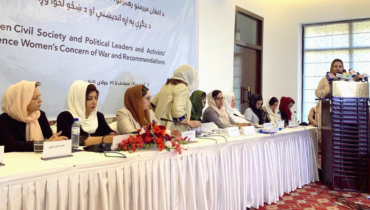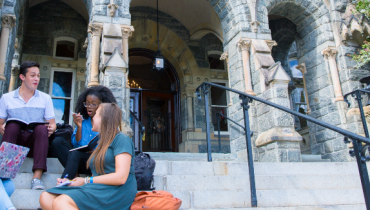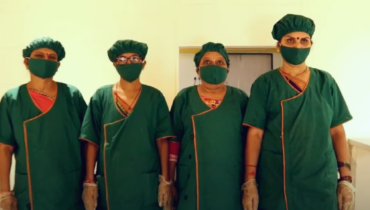By Briana Mawby and Alexandra Z. Safir
Eight weeks after taking office, Nigerian President Muhammadu Buhari visited Washington, D.C. to meet with President Obama and to discuss the challenges and opportunities facing his country.
Nigeria, one of the most powerful and economically robust countries in Africa, experienced its first peaceful transfer of power to an opposition party when Buhari won the general election in March. Former President Goodluck Jonathan’s willingness to accept the election results and step down marked a milestone for Nigeria, which is an economic and cultural hegemon in Africa. Speaking at an event at the United States Institute of Peace (USIP), Ambassador Johnnie Carson argued that “Nigeria’s significance as a nation cannot be ignored or denied.” The peaceful election has also drawn enthusiasm and praise from the international community.
However, Nigeria and the new Buhari administration also face serious challenges. The Boko Haram insurgency in the northeast has created serious security and human rights issues, and Nigerian politics is heavily impacted by corruption on all levels of government. As oil prices have decreased, the government has faced budget problems, and much of the country experiences frequent power shortages.
Women in Nigeria are particularly vulnerable. Abuse by Boko Haram militants has been well documented. Boko Haram has abducted over 2,000 people since 2009, and the group killed 4,000 people in 2014alone. Women and girls who are abducted endure repeated rape and forced marriage to Boko Haram fighters. Women are increasingly committing suicide bombing attacks, either of their own volition or because they were forced to do so by Boko Haram militants. Approximately three quarters of Boko Haram suicide attacks since 2014 being carried out by women and girls, including recent attacks in neighboring Cameroon that killed 20.
Maternal health, early marriage and girls’ education remain serious obstacles. Nearly half a million women in Nigeria suffer from vesicovaginal fistulas due to limited maternal care, and increased risk from early and forced marriage. 10.5 million children are out of school in Nigeria, especially girls living in the north. In some areas, 34% of girls are not in school.
Women and youth groups mobilized support for Buhari during the 2015 elections, and at his USIP talk, Buhari was asked how he would show them that their commitment was worthwhile. He responded that he was grateful for their support, but said that he would focus on corruption and the economic and security situation in order to benefit everyone. He said, “I belong to everybody, and I belong to nobody.” Women and girls are at the heart of Nigeria’s challenges, and they can be at the heart of its opportunities as well. Investing in social services, especially education and healthcare, and committing to the protection of civilians, especially women, is crucial to Buhari’s critical mission of change and reform.
Buhari’s reputation as an opposition leader played a prominent role in his election success, and many are hopeful that his military background will allow him to tackle Boko Haram more effectively. Before becoming a leader of opposition politics, Buhari served as the Governor of North Eastern State, the Federal Commissioner for Petroleum and Natural Resources and Head of State. Speaking at USIP on July 22, Buhari emphasized his commitment to inclusive, transparent governance and sustaining the trust of the people while in office.
Buhari also underscored the impact the United States could have in Nigeria, both in providing counterterrorism support against Boko Haram and in supporting social services. Buhari argued that the U.S. is stabilizing democracy and the political process in Nigeria, which will lead to a stronger economy and a more stable security situation. Buhari said, “The future of Nigeria and Africa lies in more democratic governance,” emphasizing that the international community, and the U.S. in particular, has a role to play in supporting education and healthcare, but that Nigerians and the government must take on the hard work of long-term change.
Both Nancy Lindborg, president of USIP, and Ambassador Johnnie Carson effusively praised Buhari and his commitment to democracy, citing Nigeria as a leader in African democracy and in democracy around the world. However, Buhari’s past record does not necessarily match the high praise he is receiving. Buhari took power through a coup d’état in December 1983 and served as head of state until he was overthrown in August 1985. His administration was marked by unprecedented powers for the Nigerian secret police, repression of critics, and the War Against Indiscipline, in which minor offences, such as not standing in line at bus stops or cheating on exams, were punished with long sentences. However, Buhari did make serious strides to end corruption during his administration, and he has served as the leading figure in Nigerian opposition politics in the last three election cycles.
While Buhari’s legacy is mixed, this is a hopeful moment for Nigeria. While American officials are praising his commitment to human rights and human-based development, this praise is not so much a commendation for past actions, but a hope that Buhari will commit to true reform of the political, economic and social spheres in Nigeria.
Since being sworn in as Nigeria’s President, Buhari has taken clear steps to show that he will combat corruption, fight Boko Haram and work to #BringBackOurGirls. Buhari has promised to prosecute the government officials involved in the illegal sale of crude oil, and he recently fired all of the military chiefs in the country for their inability to effectively counter the Boko Haram insurgency. Additionally, Buhari told Christiane Amanpour that he would be willing to negotiate with Boko Haram for the release of schoolgirls kidnapped from Chibok in April 2014.
It is evident that Buhari is trying to say and do the right things. Buhari has made clear his hope that the U.S. will become more involved in Nigeria, particularly in the fight against Boko Haram, but also in education, healthcare and development. While long-term security reform and effective anti-corruption measures may take time, it does seem that this is a moment in which both the U.S. and Nigeria see an opportunity to reform institutions and norms in one of Africa’s most powerful countries.
The international community has greeted Buhari’s election with enthusiasm. He told the USIP audience, “I intend to sustain the goodwill through performance.” “Performance” must include protection for human rights, a commitment to providing social services and respect for the vital role women play in Nigerian society, as well as a serious effort to combat Boko Haram. Nigeria is a leader of African politics, economic progress and culture; after its landmark peaceful transfer of power, Nigeria must take this opportunity to truly reform and become a leader with respect for human and women’s rights.


